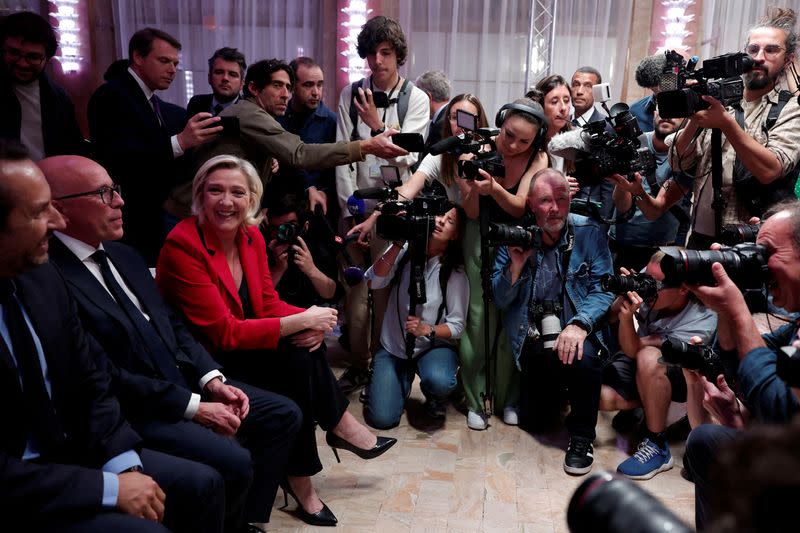Investors concerned by French elections, Paris stock market head says

By Tassilo Hummel
PARIS (Reuters) -The prospect of a politically extreme party with little or no government experience taking power after France's parliamentary elections is worrying investors, the chief executive of Paris stock market operator Euronext said on Tuesday.
The far-right National Rally (RN) party looks set to win the most votes in snap parliamentary elections in the euro zone's second-biggest economy on June 30 and July 7, with a left-wing coalition called New Popular Front forecast to come second.
"If a team that has never governed comes to power, there is total uncertainty, a complete unknown," Euronext CEO Stephane Boujnah told France Inter radio in rare political comments.
As Marine Le Pen's eurosceptic, nationalist movement appears closer to power than ever before, fuelling debates across cafes, markets and workplaces, France's business elite has kept largely silent.
Boujnah is the first well-known business figure to comment on the election. No other chief of a major French company has publicly expressed disquiet.
"There is also a lot of concern about other things that are not economic, for example about what is happening to the unity of French society and the risks that this unity, which could be damaged, could have an impact on business," Boujnah added.
An IFOP opinion poll projected the RN would win 36% of votes in the first round, ahead of the left-wing New Popular Front (NFP) bloc on 28.5% and President Emmanuel Macron's centrist alliance on 21%. France's voting system means the second round can still deliver surprises.
'CIVIL WAR'
Seeking to cast their centrist camp as the last hope for stability, Macron and his allies have turned up the volume on warnings the country could face chaos if either of 'the extremes' on the right or left wins power.
Finance Minister Bruno Le Maire has warned of a potential financial crisis, while Interior Minister Gerald Darmanin has said police were preparing for possible riots related to the vote.
But surveys from all main polling institutes indicate the strategy, reminiscent of the British government's communication ahead of the 2016 Brexit vote dubbed 'project fear', is not paying off. Macron's Together coalition remains well behind.
In the strongest comments so far, Macron said in a podcast released on Monday that both the RN party and the New Popular Front risked bringing "civil war" to France.
"The strategy of Mr Macron now is me or chaos," said Vincent Martigny, political science professor at the University of Nice.
"He's playing a very dangerous game because he wants to appear as a moderate, a stable point, but he is perceived as the one who has been putting the French in such a messy situation."
RN leader Le Pen on Tuesday rebuffed Macron's allegations.
"I think the French have realised that the chaos is him (Macron), he has embodied chaos since he was first elected," she told RTL radio.
MARKET JITTERS
The president's surprise call for snap elections earlier this month triggered a heavy selloff of French stocks and bonds.
France's economic model makes the country vulnerable when interest rates attached to its sovereign and corporate bonds shoot up, said Boujnah, whose company also runs stock markets in other European hubs including Amsterdam and Milan.
"To continue to finance a system in which 58% of what we create is injected into public spending, we have to borrow heavily from the rest of the world. And we need the rest of the world to give us loans," he said.
Investors and ratings agencies have raised concern about RN's policies such as a pledge to cut value-added tax on energy from 20% to 5.5% and to lower the legal retirement age.
So far, the party has been hesitant to put price tags on its policies, despite promises it would keep France's state budget within the boundaries agreed within the EU.
Jean-Philippe Tanguy, RN's financial pointman, on Tuesday said the party's plan to reverse Macron's pension reform, bringing the legal retirement age back to 62, would cost the state 9 billion euros ($9.65 billion).
"It will be compensated by other measures", he told France Inter radio, adding "our programme is balanced".
($1 = 0.9323 euros)
(Reporting by Tassilo Hummel, Dominique Vidalon, Blandine Henault and Johnny Cotton; editing by Christina Fincher, William Maclean)

 Yahoo Finance
Yahoo Finance 